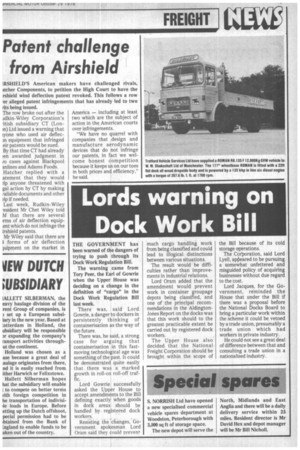Lords warning on Dock Work Bill
Page 17

If you've noticed an error in this article please click here to report it so we can fix it.
THE GOVERNMENT has been warned of the dangers of trying to push through its Dock Work Regulation Bill.
The warning came from Tory Peer, the Earl of Gowrie when the Upper House was deciding on a change in the definition of "cargo" in the Dock Work Regulation Bill last week.
There was, said Lord Gowrie, a danger to dockers in persistently thinking of containerisation as the way of the future.
There was, he said, a strong case for arguing that containerisation in this fastmoving technological age was something of the past. It could be demonstrated quite easily that there was a marked growth in roll-on roll-off traffic.
Lord Gowrie successfully asked the Upper House to accept amendments to the Bill defining exactly when goods in dock areas 1 should be handled byregistered dock workers.
Resisting the -changes,Government spokesman Lord Dram said they could prevent much cargo handling work from being classified and could lead to illogical distinctions between various situations.
The result would be difficulties rather than improvements in industrial relations.
Lord Dram added that the amendment would prevent work in container groupage depots being classified, and one of the principal recommendations in the AldingtonJones Report on the docks was that this work should to the greatest practicable extent be carried out by registered dock workers.
The Upper House also decided that the National Freight Corporation should be brought within the scope of the Bill because of its cold storage operations.
The Corporation, said Lord Lyell, api5eared to be pursuing a somewhat unfettered and misguided policy of acquiring businesses without due regard to the cost.
Lord Jacques, for the Government, reminded the House that under the Bill if there was a proposal before the National Docks Board to bring a particular work within the scheme it could be vetoed by a trade union, presumably a trade union which had workers in private industry.
He could not see a great deal of difference between that and consulting a trade union in a nationalised industry.








































































































